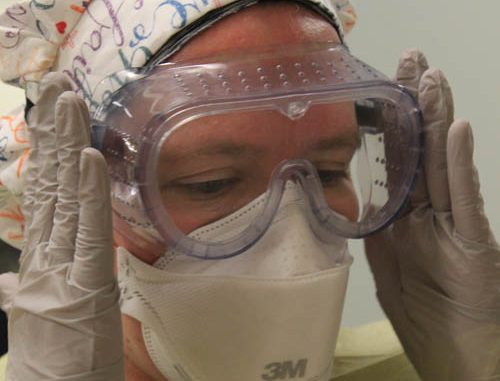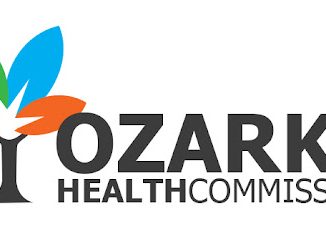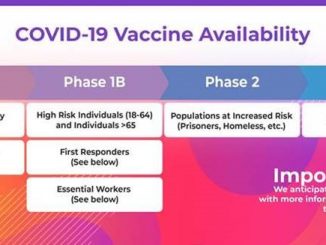
(Joplin, MO) – It all started with dry, itchy eyes for James Bourgault, a nursing supervisor in the Mercy Joplin cardiovascular intensive care unit. He suspected he had an eye infection. But then he developed a cough and then a fever. It was late March, in the midst of the COVID-19 pandemic, so Bourgault was tested for the novel coronavirus and the test came back positive.
“I had a 102-degree fever or greater for 16 straight days,” he said. “I couldn’t get rid of it. I was taking Tylenol every four-to-six hours. The worst part of it was you feel terrible, you really don’t feel like getting out of bed. My back was killing me. I couldn’t rest.”
Bourgault did not require hospitalization but still said COVID-19 was the worst sickness he has experienced in his life. Even after his fever broke, he said, respiratory issues remained that made it difficult to breathe. To this day, even months later, his visual issues still linger.
For his part, Mercy Carthage pulmonogist Dr. John Venter said he isn’t surprised and that COVID-19 can have lasting, long-term complications, even in patients who survive and recover from the most acute illness.
Venter said he has recently worked with two patients who had recovered from the worst of their COVID-19-related symptoms but later developed blood clots — even though they were receiving clot-prevention therapy.
Respiratory damage, cardiovascular issues and strokes are some of the health complications that have been found in patients who have recovered from COVID-19, he said. Those risks are particularly great in patients who required ventilators or intense oxygen therapy during their treatment.
“Patients who are on the ventilator can take many, many months before they’re back to anything close to normal lifestyles,” he said. “If you don’t have to go on the ventilator, but you’re still sick enough to be in the ICU and be on sophisticated oxygen and a variety of different treatments, they also take a long time. They don’t just go on and resume their life as it was two weeks later. The ones that do that are really the ones that weren’t sick to begin with and don’t develop some of the other later side effects, which can include blood clots, most commonly in the lungs.”
Dr. Venter will be available by phone or video conference for media interviews between 9:00 and 11:00 am on Thursday, July 30. Members of the media are asked to contact Jordan Larimore to arrange interviews.
About Mercy:
Mercy, named one of the top five large U.S. health systems for four consecutive years (2016 to 2019) by IBM Watson Health, serves millions annually. Mercy includes more than 40 acute care, managed and specialty (heart, children’s, orthopedic and rehab) hospitals, 900 physician practices and outpatient facilities, 45,000 co-workers and 2,400 Mercy Clinic physicians in Arkansas, Kansas, Missouri and Oklahoma. Mercy also has clinics, outpatient services and outreach ministries in Arkansas, Louisiana, Mississippi and Texas. In addition, Mercy’s IT division, Mercy Technology Services, and Mercy Virtual commercially serve providers and patients from coast to coast.
Reference:
Jordan Larimore, Senior Media Relations & Communications
Mercy Hospital Joplin
417.550.2928
jordan.larimore@mercy.net








Be the first to comment